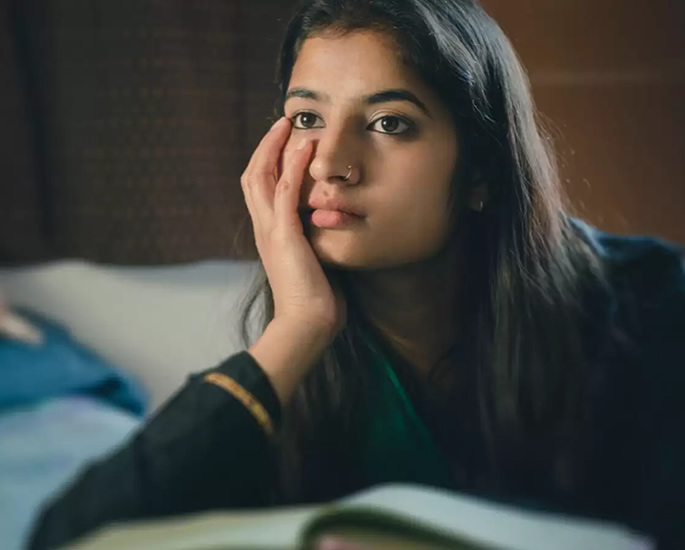"For us having and talking about desires is a no go zone"
Sexuality remains a sensitive subject matter in Desi households in Asia and the diaspora, particularly when it concerns women. Thus impacting how women engage with and understand their sexual needs.
Sexual conservatism, patriarchy and unease with female sexuality persist.
The ripple effects of this matter. There can be an undercurrent of sexual insecurity and bodily shame that profoundly impacts women.
Despite living in Britain, where open conversations about sex are encouraged, Brit-Asian women find themselves caught between two worlds.
One where sexual autonomy is, to an extent, championed for women and another where traditional South Asian values dictate modesty, purity and restraint.
DESIblitz explores whether Brit-Asian women who are from Pakistani, Indian and Bengali backgrounds struggle to understand their sexual needs.
Cultural Taboos, Norms and Silence

The South Asian community is rich in culture, traditions, and values and once was more open in its engagement with sex and sexuality.
However, British colonialisation changed this, leading to the policing of South Asian women’s bodies and desires. In addition to positioning enjoyment of sex and sexuality as problematic for women.
In stark contrast, Desi men have greater socio-cultural leeway. Their sexual needs and engagement in sex are seen as natural, not to be policed.
Good, honourable women are seen as pure, innocent, having no desires, especially before marriage. Desi women can face negative socio-cultural and family judgements for openly embracing their sexuality.
Accordingly, today, South Asians continue to struggle to engage in conversations around sexuality. There can be a heavy silence that profoundly impacts Brit-Asian women.
Brit-Asian women can find that questions and information about sex and sexuality are repressed.
This repression can be internalised and lead to acute discomfort when it comes to thinking about and talking about their needs and desires.
Thirty-four-year-old Minaz, a British Pakistani, revealed:
“For us, having and talking about desires is a no-go zone, especially unmarried. Unlike Asian guys, we women are meant to have needs buried deep.
“In my family, both culturally and from a religious standpoint, sex is after marriage. When I asked questions, my mum focused on STDs and contraception.
“When I got engaged, mum was like ‘your husband will know what to do, and I have a right to say no’.
“It’s absurd; luckily me and my husband spoke before and after marriage about intimacy. It was awkward as hell initially, and I wanted a hole to open up and eat me.
“Then, the more I started reading, I realised all the taboos in not talking about sex are cultural.
“In Islam, it says it is the duty of the husband to ensure his wife reaches fulfilment. That he doesn’t force her and push her to orgasm.
“Yet we’re not taught this at all. Sex, desire, women enjoying sex is seen as dirty and to be whispered about.
“Things are changing. Before marriage, I had a married friend I talked to. Speaking to her helped me get the courage to speak to my then fiancé.”
Shame and Unease with Their Bodies and Desires?

The lack of open conversations around sex, Desi women’s sexual needs, and their legitimacy can lead to feelings of shame and unease.
Dr Sarika Persaud, also known on Instagram as Dr Samosa, is a New York Indo-Guyanese psychologist. She stresses the need for women to be comfortable and happy in themselves, their bodies and sexualities:
“There’s so much shame about the self and the body.
“Women especially are held to a double standard, and it’s so confusing.
“If you look one way, you won’t get a husband. If you look sexual, no one will want to hire you for a job.
“Regardless of the South Asian ethnic group, there’s the same shame and belief that your body has to look a certain way, and if it doesn’t, you’re not desirable. Everything gets tied up in sexual shame.”
British Bengali Ruby* is 29 years old and found it challenging in her early 20s to not hide from her needs and feel shame in her body:
“When I first started to get curious and have urges, it was like shit, what do I do.”
“If felt ashamed of my body and what it wanted. You hear about boys and men having urges but not girls and women.
“After I married, my husband spent a lot of time and effort helping me get comfortable with my own body and desires.
“He helped unravel so much for me and showed me there’s no shame in me voicing what I want. But him having to do that shouldn’t have been the case.”
Brit-Asian women can find support and information online, where they can anonymously discuss issues around sex and understand their sexual needs.
Romantic partners and spouses can also be a key source of support and information.
However, open dialogue needs to occur outside the digital realm, which allows unmarried and married Desi women to comfortably ask questions and learn.
The absence of conversations has serious implications for mental, emotional, and physical health and relationships.
Anxiety over Lack of Sexual Experience and Understanding Needs

Desi women across age groups, married, unmarried and divorced, can also face anxiety over a lack of sexual experience.
Sexual inexperience and the feelings that can manifest from it is something that is not talked about, but it is a reality for Desi women.
Twenty-five-year-old British Kashmiri Aliyah* disclosed her unease:
“I want to wait until I’m married to have sex, but not knowing anything at all was and is stressing me out.
“I get not having sex due to my religion and culture, but why does that mean no conversations on the fact yes I actually do have needs.
“Why can’t we have a space to talk about all this with other women, with our mums and friends?”
Anxiety over sexual inexperience can be a key issue for South Asian individuals “due to religious and cultural beliefs about sexuality, virginity, and gender”, as Dr Persaud discussed.
View this post on Instagram
It is not just British Asian unmarried women who can struggle with understanding and engaging with their sexual needs.
Reba*, a 46-year-old British Indian, stated:
“It was 10 years after my first marriage that I married again, this time for love.
“My first marriage was arranged, and what happened in the bedroom was a duty; the times I gained enjoyment were a blessing. But that was not all the time.
“I didn’t mention things I wanted.”
“My lack of experience and knowledge about how to enjoy it, had me very scared. I am also from a generation where it was not normal to talk about these things.
“We are raised to think it is our roles as daughters, mothers and wives that matter, nothing else.
“The lack of talking between women needs to change. We have so much knowledge and experience that it should be shared appropriately.
“I’ve been open with my daughters; they know they can come to me.
“Starting those conversations was painful, but those conversations also helped liberate me.”
For some British-Asian women, sexual expectations within marriage are often influenced by cultural norms.
Traditional South Asian marriages frequently emphasise the importance of duty and family, with less focus on personal satisfaction.
Thus, some like Reba have felt and may still feel their sexual needs are secondary to their roles as wives and mothers.
Not Understanding Sexual Needs: What to Do?

Due to socio-cultural norms that silence and police women’s desires and bodies, Desi women can struggle to understand their sexual needs.
Indeed, this can be the reality for Brit-Asian women, unmarried, married and divorced. It is a reality that needs to change.
Reba stressed that there is a need for fundamental change within British Asian communities, for her women play a crucial role:
“Like I said, the lack of talking between women needs to change. We do none of ourselves any favours.
“There is a need to slowly pick at the knots that silence us. There is nothing wrong with having needs, making demands and asking questions.
“If men can, why can’t we? Unmarried girls should not be left unlearned.
“Knowledge is power; it gives confidence. We need to recognise that is true in this context as well.”
“Just because we talk doesn’t mean girls will go wild and do things that are wrong or immoral.”
For some Brit-Asians, the taboo around female sexual needs leaves them feeling embarrassed and confused about what to do. They yearn for open dialogue with other women.
Maya*, a 29-year-old British Indian and Pakistani, nervously revealed:
“I mean, I got curious and ordered a vibrator, but I still haven’t used it because I’m scared.
“Can’t ask Mum; she’ll freak. I don’t have a sister or friends; I just can’t.
“Going on online forums feels weird for me, so I’m just burying it in my drawer for now.
“Wish I felt comfortable to speak to someone. Maybe one day.”
British-Asian women often find themselves internalising and navigating conservative and traditional cultural expectations.
Many of these expectations conflict with modern attitudes toward sexual autonomy, leading to tension and a lack of understanding of their sexual needs.
Open dialogue and a sense of safety for women to ask questions need to be fostered within homes, communities, and through interpersonal bonds.
The words of the Brit-Asian women here, shows that women play a crucial role in fostering a space that allows open conversations.
Thus enabling Brit-Asian women to comprehend and embrace their sexual needs and sexuality more freely.






























































